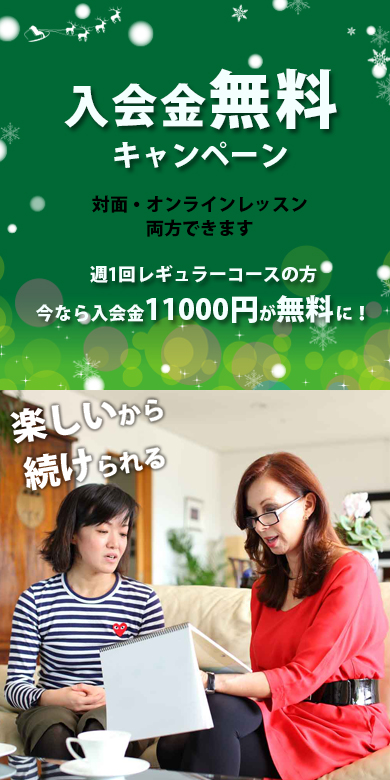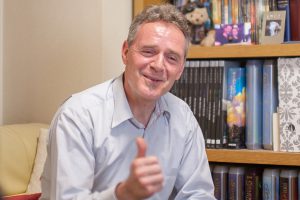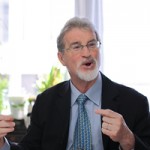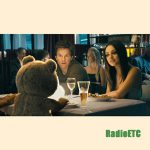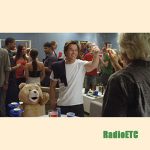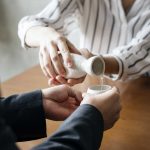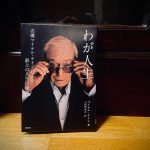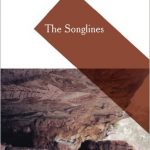オルタナティブ・メディアをチェックしよう!~Democracy Now!
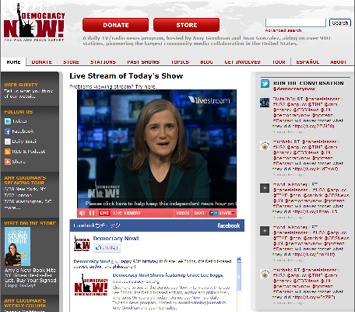 ETCマンツーマン英会話のマイク先生(新小岩)から封書が届きました。そこには、福島第一原子力発電所の事故のニュースを報じる、米国のあるオルタナティブ・メディアの記事が同封されていました。オルタナティブ・メディア(alternative media)とは、既存の主流のニュースメディアに取って代わる、新しいメディアのこと。
ETCマンツーマン英会話のマイク先生(新小岩)から封書が届きました。そこには、福島第一原子力発電所の事故のニュースを報じる、米国のあるオルタナティブ・メディアの記事が同封されていました。オルタナティブ・メディア(alternative media)とは、既存の主流のニュースメディアに取って代わる、新しいメディアのこと。
「主流メディアが扱うニュースだけでなく、オルタナティブ・メディアの情報にも着目しよう」というのが先生のアドバイス。日本のテレビ、大手新聞等、マス・メディアが報じるニュースだけでは、日本の人々に事実が伝わっていないのではないだろうか、ということを心配されているようです。
「そして、いずれのメディアにしろ、そのニュースの本質を自分自身の責任で読み解く判断力を付けることも大切」と、強調されていました。
そこで今日は、オルタナティブ・メディアの一つとして、Democracy Now!(デモクラシーナウ!)をご紹介します。
Democracy Now!は、ニューヨークにある非営利の独立放送局。平日の月曜日から金曜日まで1時間のニュース番組を放送。ウェブ上で視聴することができます。司会を務めるエイミー・グッドマン(Amy Goodman)とフアン・ゴンザレス(Juan Gonzalez)はジャーナリストとして数々の賞を受賞しています。
商業メディアが取りこぼしがちな様々なコミュニティの声をとりあげ、グローバリゼーション、民主主義、戦争、環境破壊などのテーマに注目し、市民の立場から物事の本質に迫っています。1996年に10あまりのコミュニティラジオ局で放送が開始され、現在は北米最大の公共メディア・ネットワークへとなり、全米800局を超えるラジオ&テレビ局で、英語とスペイン語で放送されています。広告はもちろん、企業からの財政支援や政府の資金を一切、受け取っていません。番組は、視聴者や支援者からの寄付に支えられ、編集の独立性を維持しています。
過去のアーカイブを視聴することもでき、また、ほぼすべてのニュースに対してトランスクリプトが掲載されていますので、聞き取れない内容があっても必ず確認することができます。
ではまず、6月10日に放送された「Japan Admits 3 Nuclear Meltdowns, More Radiation Leaked into Sea; U.S. Nuclear Waste Poses Deadly Risks」を見てみましょう。
■ヘッドラインから Almost three months after the earthquake and tsunami that triggered a nuclear disaster in Japan, new radiation “hot spots” may require the evacuation of more areas further from the damaged Fukushima Daiichi nuclear power facility. Japan’s Nuclear and Industrial Safety Agency recently admitted for the first time that full nuclear meltdowns occurred at three of the plant’s reactors, and more than doubled its estimate for the amount of radiation that leaked from the plant in the first week of the disaster in March. “What they failed to mention is that they discharged an equally large amount into the ocean,” says our guest Robert Alvarez, former senior policy adviser to the U.S. Secretary of Energy. “As [the radiation] goes up the food chain, it accumulates. By the time it reaches people who consume this food, the levels are higher than they originally were when they entered the environment.” Alvarez also discusses his new report on the vulnerabilities and hazards of stored spent fuel at U.S. reactors in the United States. Then we go to Tokyo to speak with Aileen Mioko Smith, executive director of the group Green Action. She says citizens leading their own monitoring efforts are calling for additional evacuations, especially for young children and pregnant women.
[キーワード]
evacuation: 避難
Nuclear and Industrial Safety Agency: 原子力安全委員会 leak: 漏れ(出)る
discharge: 排出する
food chain: 食物連鎖
accumulate: 長期にわたってためる、蓄積する
vulnerability: 傷つきやすいこと、脆弱性
hazard: 危険
spent fuel: 使用済み核燃料
日本で地震と津波が引き金となった核の惨事が発生して約3カ月、新たに判明した「放射能ホットスポット」が、損傷した福島第一原発からの避難区域をさらに離れた場所にまで拡大させる恐れが出てきました。原子力安全保安院は最近になって初めて3基の原子炉で完全な燃料棒のメルトダウンが起きていたことを認め、さらに3月の事故発生後1週間で大気中に漏れ出ていた放射性物質の推定量を2倍に引き上げました。「彼らが言い忘れているのは、膨大な同じ量の放射性物質が海にも流れ出たということ」と本日のゲスト、元米国エネルギー省長官上級政策顧問ロバート・アルバレスは言います。「(放射性物質は)食物連鎖の上位に立つほど蓄積される。人間が食べる時の放射能レベルは最初に環境に入ってきたときよりずっと高くなるのだ」。東京からは脱原発グループ「グリーン・アクション」の事務局長アイリーン・美緒子・スミスに聞きます。日本では市民が自ら放射能モニタリングを行って、とくに子どもや妊娠女性に対する避難措置の拡大を求めていると彼女は言います。
■インタビューから JUAN GONZALEZ: Bob Alvarez, I’d like to ask you about this problem that the public confronts of governments misrepresenting, or sometimes actually lying, to the public in terms ― when these major disasters occur. I mean, going back, from Three Mile Island, Chernobyl, most recently the BP spill in the Gulf, or the collapse of the Twin Towers and the health effects for the public, and now here we have in Japan ― the tendency of government always to withhold information that they immediately have from the public. Doesn’t this eventually lead to just general mistrust of people to what the government is saying in these disasters?
フアン・ゴンザレス: アルバレスさんに、この問題についてお尋ねします。大災害が発生した時、誤った情報を伝える、もしくはしばしば実際に国民に対して明らかな嘘をつく政府に、国民は対峙しなければなりません。過去の事例では、スリーマイル島、チェルノブイリ、直近ではガルフ湾におけるBP社の原油流出、ツインタワーの崩壊と国民の健康被害。そして今、日本はこの問題に対峙しています。つまり、政府は即座に国民から情報を得ているにもかかわらず、それを公にしない傾向があります。これは、大災害における政府の発表に対して、国民の不信感を招く結果にならないのでしょうか。
ROBERT ALVAREZ: Oh, yes, of course. I think the nuclear industries, particularly in the United States and elsewhere, Russia, Japan, have a very long history of withholding information and misleading the public about the hazards of their activities. And in this country, it went on for many years, and during the open-air bomb testing program, for example. The nuclear industry enjoys this rather unique status because of its origins in the nuclear weapons program and that it’s a system that has been fostered under conditions of secrecy, isolation and privilege, and they do not consider it in their interest to be candid with the public. I used to work in the Energy Department for six years and was a former, I guess you would say, nuclear insider. And the mindset that I encountered there was that they ― the people who were reluctant to reveal candid information about the nature of the hazards from these activities ― was that we can’t scare people, scaring people is worse than telling them the truth. And I think that that’s a fundamental ― a fundamentally wrongheaded assumption.
ロバート・アルバレス: はい、もちろんです。原子力産業、特にアメリカやロシア、日本などは、情報を公開せず彼らの活動の危険性について国民を欺いてきたという非常に長い歴史を持っています。アメリカでは、何年もの間、たとえば核実験が行われていた時代がそうです。原子力産業は元々は核兵器開発から始まったものですから、とても特殊な地位を保持してきました。秘密厳守で隔離され、特権が与えられた条件の元で育成されてきましたので、国民に正しい情報を開示するということには彼らは関心がありません。私はかつてエネルギー省で6年間働いていましたので、元原子力産業内部の人間と言えるでしょう。当時の私が出遭った人々の考え方、原子力産業の危険性の本質についてありのままの情報を明らかにすることを渋る人々の考え方は、「私達は人々を怖がらせてはいけない。人々を怖がらせることは、事実を告げることよりも劣る」というものです。この根本的に誤った仮説、これが根本にあると思います。

